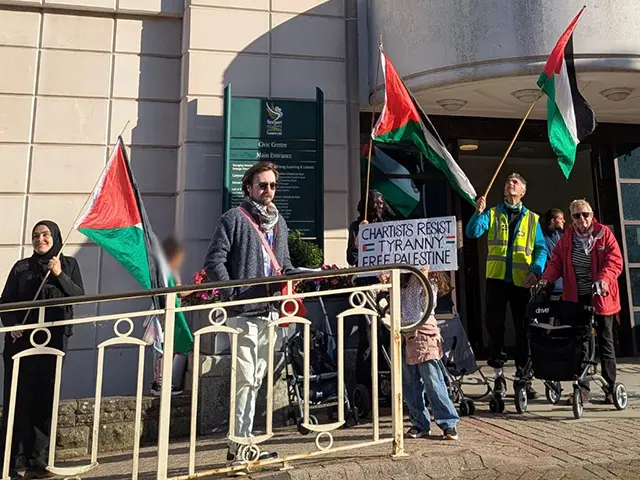Support quality, independent, local journalism…that matters
From just £1 a month you can help fund our work – and use our website without adverts. Become a member today

A multi-billion-pound Gwent pension fund will seek further advice after two local authorities demanded a review of investments linked to Israel’s conflict in Gaza.
The Greater Gwent Pension Fund, which manages more than £4 billion on behalf of public sector workers across the region, has faced calls to withdraw investments from companies alleged to be linked to Israel’s military offensive.
Monmouthshire and Newport City councils, both members of the fund, passed motions in September requesting a review of whether any pension assets are held with firms connected to the conflict or accused of violating international law.
Local Palestine solidarity campaigners have also urged the fund to divest from firms involved in the Israeli occupation of Palestinian territories.
Administered by Torfaen Borough Council, the Gwent fund is part of the Wales Pension Partnership (WPP), which manages investment policies for eight local authority funds.
The WPP has said it has undertaken work to consider how a “policy of exclusionary practices” – where an active decision against investment in certain sectors or firms is adopted – could be established and implemented.
Cllr Nathan Yeowell, chair of Torfaen’s pension committee, said the Welsh funds had been working on such a policy for the past year due to “frustration” at any mechanism to withdraw funds from firms at odds with it climate change ambitions.
However, he said the new framework would not operate on a geographic “jurisdiction-by-jurisdiction” basis or amount to adopting a Boycott, Divestment and Sanctions (BDS) stance.
“I don’t see this as any move to more of a BDS position,”said Cllr Yeowell, who added that fund chairs had been “serially ignored” by firms over climate concerns despite repeated engagement attempts.
The joint governance committee of the eight councils has asked the Welsh fund to prepare a draft exclusion framework for discussion in December, which will consider the key principles that could be embedded in the framework.
Cllr Yeowell said the fund would respond to both councils and “set out the position where we are and the art of the possible in 2025.” He said investment figures would be provided by the end of December or in January.
He said figures cited by the Palestine Solidarity Campaign—which claimed the Gwent fund had £233 million tied to firms linked to Israel’s actions in Gaza, and the WPP £1.1 billion—are disputed.
He said private assessment undertaken by officers suggested the Gwent Fund held £3.8m of indirect investments in Israeli domiciled companies – worth the equivalent of 0.08% of total assets as of June 2025.

The policy framework is expected to set out how companies could be deemed off-limits for investment, identify information sources, and consider policy and financial implications.
Reports for the Torfaen pension committee’s October meeting show the Gwent fund was worth £4.617 billion at the end of June, which was the second quarter of the year, a figure which increased by around £195m to £4.812bn at the end of August.
Over the past year the fund returned at plus 7.31% which is 0.24% below the benchmark return of plus 7.55%.
Members were told to “remain mindful of the long-term nature of the fund’s investment strategy” and while it is “well positioned to benefit from market rallies” it is “suitably diversified” to mitigate short term risks with its long-term performance “positive”.
Support quality, independent, local journalism…that matters
From just £1 a month you can help fund our work – and use our website without adverts.
Become a member today
